
The Jameel Observatory for Food Security Early Action is being created to help tackle the growing threat to people in the world’s drylands posed by the increasing severity and frequency of climate-related disasters.
The new venture will bring together the expertise of five partners – the University of Edinburgh, the International Livestock Research Institute (ILRI), Save the Children, the Abdul Latif Jameel Poverty Action Lab (J-PAL), and Community Jameel.
The partnership will connect cutting-edge technology and data surveillance on early warning signs of severe weather and systemic climate change with community-driven applications and interventions.
Digital tools
The Jameel Observatory will engage with agencies that work with farmers to develop and apply digital and analytical tools that help them shape their own food security, nutrition and livelihoods.
Researchers plan to use community-level data together with satellites, drones, weather data and remote sensing to understand, prepare for, and mitigate the likely impact of climate shocks.
The Jameel Observatory’s first project aims to fill the evidence gaps that currently prevent effective forecast-based action to protect children and their families’ livelihoods and nutrition in parts of East Africa.
Climate crisis
As the world turns its attention to the UN Food Systems Summit and COP26, there is a sharp focus on the need to be fully prepared for the vulnerabilities, shocks, and stresses triggered by changing climate.
Drylands, which are home to billions and make up 40 per cent of the word’s land area, are at risk from fluctuating rainfall, drought, rising temperatures and land degradation. These create insecurity and conflict caused by competition for resources.
By the time the full force of these crises is felt and hunger takes hold it is often too late to respond effectively, experts say.
Varied expertise
Each partner will bring specific insights to the work of the Jameel Observatory. The University of Edinburgh will use its expertise in data-driven innovation to combine data, information and local knowledge to better predict climate risks, encourage coordinated actions and guide interventions.
The Jameel Observatory will be based at the International Livestock Research Institute, a CGIAR Research Center, in East Africa. ILRI works with hundreds of partners throughout the continent and is home to the Mazingira Centre and other projects focused on food security and environmental research in dry lands.
Save the Children has been working to tackle hunger and malnutrition in some of the toughest places in the world for 100 years. The aid agency brings a wealth of practical and programmatic experience supporting communities to respond, prepare and adapt. Save the Children is committed to strengthening forecast-based action to food crises using tools like the Household Economic Analysis to predict the impacts of climate shocks on vulnerable families.
The Abdul Latif Jameel Poverty Action Lab is an evaluation and knowledge partner and will connect Jameel Observatory with teams of researchers to help assess the initiative’s interventions. J-PAL will also share evidence on effective climate change and adaptation programs from existing experimental evaluation literature.
Community Jameel is an international organisation tackling some of the world’s most urgent issues and challenges, with action and solutions based on evidence, science, data and technology. It is supporting the Jameel Observatory and providing its expertise in establishing collaborative institutes and research programmes for the past 75 years.
The Jameel Observatory will deliver targeted decision-making tools to those who are facing the most challenging effects of climate change. We know that no single organisation has the ability to address the complexities facing drylands communities. With expertise in data-driven innovation in a range of contexts, the University of Edinburgh is well-placed to lead this partnership by bringing pastoralist communities together with experts in big data, earth observation and food security.
Alan Duncan
University of Edinburgh’s Global Academy of Agriculture and Food Security
Alan Duncan contines by saying that this work must tackle real problems faced by real people and that the project aims to complement other food security initiatives already underway.
The Jameel Observatory continues Community Jameel’s tradition of supporting initiatives that align expertise, resources and data to have an impact. It will address the effects of the climate crisis – the great challenge of our time – through bold solutions that combine international, regional and local perspectives, ensuring they are fit for purpose and can be implemented at scale. As the Jameel family marks 75 years of philanthropy and business this year, we are inspired by our partners in this new venture, and look forward to contributing our own strategic input to ensure its success.
Fady Jameel
Vice Chairman of Community Jameel
Related links
Global Academy of Agriculture and Food Security
[Image credit: Steve Mann]

